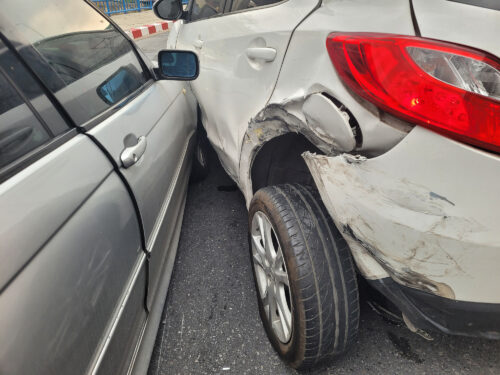
The Short Answer:
If you want to get the highest possible payout after a car accident, you need to approach your claim like building a solid case in court—even if it never gets that far. The key is to prove the full extent of your damages and avoid mistakes that give the insurance company an excuse to pay less. That means collecting strong evidence from day one, seeking immediate medical care, and working with an experienced personal injury lawyer who knows how to negotiate aggressively on your behalf.
Key Takeaways
- Document everything from the start—photos, medical records, and bills all strengthen your claim.
- Get medical attention right away and follow your doctor’s instructions to show the full impact of your injuries.
- Work with an experienced personal injury attorney who can calculate the real value of your damages and negotiate a fair settlement.
- Don’t rush to accept the first offer—insurance companies often start low to save money.
- Avoid common pitfalls such as posting about your accident on social media or giving recorded statements to insurance adjusters without legal advice.
Table of Contents
- 1. Gathering Strong Evidence
- 2. Seek Medical Attention Immediately
- 3. Complete All Follow-Up Care
- 4. Track All Damages and Losses
- 5. Be Careful When Talking to Insurance Adjusters
- 6. Hire a Personal Injury Attorney
- 7. Never Accept the First Offer
- 8. Don’t Post on Social Media
- 9. Start the Process As Soon As Possible
- 10. Understand the Full Value of Your Claim
- 11. Avoid Common Mistakes That Reduce Settlements
- 12. Consider Mediation or Alternative Dispute Resolution
- 13. Know When to Go to Court
- Car Accident Settlement FAQs
- Contact Jim Glaser Law to Pursue a Car Accident Settlement
1. Gathering Strong Evidence
The strength of your settlement depends heavily on the quality and completeness of your evidence. From the very beginning, treat your accident as if it might end up in court—even if you hope to settle.
- Photograph the scene: Capture wide shots of the accident location, vehicle damage, skid marks, traffic signs, and any weather conditions that might have contributed.
- Collect witness statements: Get names and contact information for anyone who saw the crash. Their neutral perspective can support your version of events.
- Secure the police report: Request a copy as soon as it’s available. This official record often carries significant weight in settlement negotiations.
- Preserve every record: Save medical bills, repair invoices, towing receipts, and any communication with insurance companies. These documents create a clear paper trail of your losses.
By organizing and preserving evidence early, you give your attorney the tools to build a compelling case and demand the full compensation you may deserve.
2. Seek Medical Attention Immediately
Even if you feel fine after a crash, see a doctor as soon as possible. Some injuries, like whiplash, internal bleeding, or concussions, don’t always show symptoms right away. A prompt medical evaluation protects both your health and your claim.
- Create a clear medical record: Early treatment documents the link between the accident and your injuries, making it harder for the insurance company to argue that something else caused your pain.
- Prevent hidden complications: Immediate care helps doctors catch injuries that might worsen over time if left untreated.
- Strengthen your case for full compensation: When you can show that you sought care right away, it’s easier to recover costs for treatment, rehabilitation, and any long-term effects.
Quick medical attention is more than just good health practice—it’s an important step toward securing the highest possible settlement.
3. Complete All Follow-Up Care
Getting checked out right after the accident is only the first step. To protect both your health and your settlement, you need to complete every recommended treatment and follow your doctor’s instructions closely.
- Show the full impact of your injuries: Consistently attending follow-up appointments, therapy sessions, or specialist visits creates a clear timeline of how the accident affected you over time.
- Avoid giving insurers ammunition: If you skip visits or stop treatment early, insurance adjusters may argue that you weren’t seriously hurt—or that you made your condition worse.
- Support claims for long-term costs: Detailed medical records from ongoing care help justify compensation for future treatment, rehabilitation, or reduced earning capacity.
By staying on top of your care plan, you strengthen both your recovery and your ability to secure a fair settlement.
4. Track All Damages and Losses
Your settlement should cover every loss you suffer—not just immediate medical bills. To make sure nothing is overlooked, keep detailed records of both financial and non-financial damages.
- Economic damages: Save pay stubs, tax records, and employer letters to document lost wages or reduced earning capacity. Keep all receipts for out-of-pocket costs such as rental cars, prescription medications, or home modifications.
- Non-economic damages: Maintain a personal journal describing pain levels, emotional distress, and how the accident affects your daily activities or relationships.
- Future expenses: Ask your doctor or specialists for written estimates of ongoing treatment needs, like long-term physical therapy or surgeries.
Thorough documentation of both tangible costs and personal suffering gives you and your attorney the evidence needed to demand full compensation.
5. Be Careful When Talking to Insurance Adjusters
Insurance adjusters may seem friendly, but their job is to save the company money, not to maximize your settlement. Be polite, but protect your rights at every step.
- Limit what you share: Provide only basic facts such as the date, time, and location of the crash. Avoid discussing fault or giving opinions about how it happened.
- Avoid recorded statements without legal guidance: Insurers may ask to record your statement early on. Politely decline until you’ve spoken with a lawyer.
- Stay consistent: If you do speak with them, keep your story brief and consistent. Even small inconsistencies can be used to challenge your credibility.
By setting boundaries with adjusters and letting your attorney handle negotiations, you prevent accidental missteps that could reduce your payout.
6. Hire a Personal Injury Attorney
An experienced personal injury lawyer can be the difference between a lowball payout and a settlement that fully covers your losses. Insurance companies have teams of professionals working to minimize what they pay—you deserve an advocate who knows how to fight back.
- Accurate claim valuation: A lawyer can calculate the true value of your claim, including future medical costs, lost earning capacity, and pain and suffering.
- Skilled negotiation: Our attorneys know the tactics insurers use and can push for a higher settlement while avoiding common pitfalls.
- No upfront cost: Most Massachusetts car accident lawyers, including ours, work on a contingency fee basis, otherwise known as no-win, no-fee.
- Representation if litigation is necessary: If negotiations fail, your attorney can file a lawsuit and represent you in court.
Having professional legal representation levels the playing field and significantly increases your chances of receiving the maximum compensation.
7. Never Accept the First Offer
Insurance companies often start negotiations with a lowball settlement to see if you’ll settle quickly. Accepting too soon can leave you responsible for expenses that surface later.
- Understand the tactic: The first offer is usually designed to save the insurer money, not to cover your full losses.
- Evaluate the true costs: Make sure all medical treatment is complete—or at least that doctors can estimate future care—before agreeing to a number.
- Negotiate strategically: Your attorney can counter the initial offer with evidence of your damages, often prompting a more realistic second proposal.
By holding out for a fair offer and negotiating from a position of strength, you can significantly increase the final settlement amount.
8. Don’t Post on Social Media
It might feel natural to update friends and family after an accident, but your social media posts can be used against you during settlement negotiations.
- Photos and posts can be misinterpreted: Even something as simple as a smiling photo at a family gathering could be used to argue that your injuries aren’t serious.
- Comments can be taken out of context: Casual statements—like “feeling better today”—might be twisted by insurance adjusters or opposing counsel.
- Privacy settings aren’t foolproof: Even with strict privacy controls, posts can be discovered through legal requests.
To protect your claim, avoid posting about your accident, your injuries, or your recovery until the case is fully resolved.
9. Start the Process As Soon As Possible
Time is critical after a car accident. Delaying your claim can weaken your case and even jeopardize your ability to recover compensation.
- Preserve evidence: Skid marks fade, vehicles get repaired, and witnesses’ memories fade. Starting quickly helps ensure you capture this information while it’s still fresh.
- Meet legal deadlines: Every state sets a statute of limitations—the legal time limit for filing a claim. Missing it can bar you from recovering any damages.
- Show the seriousness of your claim: Prompt action signals to insurers that you’re taking the process seriously, making them more likely to negotiate in good faith.
By acting early and keeping the process moving, you protect your right to full compensation and strengthen your negotiating position.
10. Understand the Full Value of Your Claim
A fair settlement goes beyond just paying for the damage to your car or your immediate hospital bills. To truly maximize your compensation, you need to understand all categories of the damages you’re entitled to claim.
- Medical expenses—past and future: Include hospital stays, surgeries, physical therapy, medications, and any anticipated long-term care.
- Lost income and reduced earning capacity: Document wages lost during recovery and, if applicable, any permanent impact on your ability to work.
- Pain and suffering: Compensation for physical pain, emotional distress, and reduced quality of life.
- Property damage and out-of-pocket costs: Car repairs, rental cars, towing fees, and any modifications needed for your home or vehicle.
By calculating every type of loss, you and your attorney can build a settlement demand that reflects the true impact of the accident—not just the obvious expenses.
11. Avoid Common Mistakes That Reduce Settlements
Even a strong claim can lose value if you make avoidable missteps. Being aware of these pitfalls helps you protect the full worth of your case.
- Signing documents too soon: Don’t sign medical releases or settlement agreements without reviewing them with your attorney. These can limit your ability to seek additional compensation later.
- Downplaying your injuries: Telling doctors or insurers you feel “fine” can be used to argue that your injuries are minor. Always describe symptoms accurately.
- Skipping recommended treatment: Missing appointments or stopping care early gives insurers an excuse to claim you worsened your condition.
- Talking about the case publicly: Beyond social media, avoid casual conversations about your claim that could be misinterpreted or relayed to insurance adjusters.
By avoiding these common mistakes, you keep your claim strong and maintain leverage during settlement negotiations.
12. Consider Mediation or Alternative Dispute Resolution
If negotiations with the insurance company stall, mediation or other forms of alternative dispute resolution (ADR) can help you reach a fair settlement without the time and cost of a full trial.
- Mediation explained: A neutral third party—called a mediator—facilitates discussions between you and the insurer to help both sides agree on a settlement.
- Less time and expense: Mediation and arbitration are usually faster and less expensive than taking the case to court.
- Keeps control in your hands: Unlike a trial, mediation gives you and the insurer the power to decide the outcome rather than leaving it to a judge or jury.
By exploring ADR options, you may secure a fair settlement sooner and with less stress, while still protecting your right to proceed to court if necessary.
13. Know When to Go to Court
Sometimes, the only way to secure a fair settlement is to file a lawsuit. While most car accident claims settle out of court, understanding when litigation is appropriate can help you protect your rights.
- When negotiations stall: If the insurance company refuses to make a reasonable offer or denies your claim altogether, a lawsuit can put pressure on them to negotiate seriously.
- When damages are high or liability is disputed: Cases involving severe injuries or complex fault issues may require a judge or jury to decide fair compensation.
- Your attorney’s guidance: A personal injury lawyer can advise you on the right time to file suit and prepare the case for trial if necessary.
Taking the case to court can be intimidating, but it often provides the leverage needed to obtain a full and fair recovery.
Car Accident Settlement FAQs
Settlement values depend on factors such as the severity of injuries, cost of medical treatment (including future care), lost income, property damage, and the clarity of evidence proving the other driver’s fault. Pain and suffering, emotional distress, and long-term disability can also increase the value.
Build leverage with strong documentation: medical records, accident reports, and proof of lost wages. Avoid accepting the first offer, and let an experienced personal injury attorney handle negotiations to counter lowball tactics from insurers.
Typically, you’re entitled to the fair market value of your vehicle right before the accident. This is based on age, mileage, condition, and comparable local sales, not the amount you originally paid.
Straightforward claims might resolve in a few months, while cases involving serious injuries or disputed liability can take 6 months to a year or longer, especially if a lawsuit becomes necessary.
Massachusetts follows a modified comparative fault system. This means you can still recover compensation even if you were partly responsible—as long as you are less than 50% at fault. However, your settlement will be reduced by your percentage of fault.
For example, if you’re found 20% at fault and your total damages are $100,000, you can still recover $80,000. But if you are more than 50% at fault, you cannot collect any damages. Because fault percentages can significantly affect your payout, it’s crucial to work with an experienced personal injury attorney who can gather evidence and negotiate to minimize your assigned share of fault.
While it’s possible to negotiate on your own, a personal injury attorney can often secure a significantly higher settlement, handle communications with insurance companies, and help ensure you meet all legal deadlines.
Not usually. Most cases settle out of court once insurers realize you’re prepared to fight for full compensation. But filing a lawsuit can be a powerful tool when the insurer refuses to make a fair offer.
Generally, no. Once you sign a settlement release and accept payment, the claim is closed—even if you later discover additional injuries or expenses. That’s why it’s best to wait to settle after you know the full extent of your damages. Working with an attorney will help you ensure all of your damages are accounted for in the settlement.
Contact Jim Glaser Law to Pursue a Car Accident Settlement
If you’ve been injured in a car accident, you don’t have to face the insurance company alone. Jim Glaser Law has the experience and resources to fight for the maximum compensation you may deserve.
- Free case review: We’ll evaluate your claim and explain your options with no obligation.
- No upfront fees: You pay nothing unless we win your case.
- Proven results: Our team has helped countless accident victims recover settlements that cover medical bills, lost wages, and long-term needs.
Call Jim Glaser Law today or fill out our online form to schedule a free consultation and start building a strong case for your car accident settlement.
















